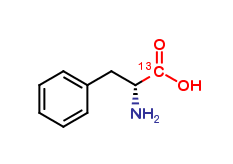1-13C-D-Phenylalanine
| Product Name | 1-13C-D-Phenylalanine |
|---|---|
| Alternate Names | Phenylalanine Stable Isotopes, Stable Isotopes of Phenylalanine |
| CAT No. | CS-T-84020 |
| CAS No. | 1202063-94-2 |
| Category | Stable Isotopes |
| Stock | Enquire |
| Mol. Wt. | Not Available |
| Mol. For. | Not Available |
| Hazardous | This is not a Hazardous Compound |
| COA | View Sample COA |
| MSDS | View Sample MSDS |
| Parent API | Phenylalanine |
| Smileys | O=[13C](O)[C@H](N)CC1=CC=CC=C1 |
| Controlled | No |
| Shipping | Free for purchase above 1000$ |
| Delivery | In-Stock, products will be dispatched within 24 hours via FedEx for USA, Europe, and other countries. |
| Return | Returns/replacement accepted if you are not satisfied with the quality of the product, (please send us an email with the reason/issues which are facing, within 15 days, after receipt of the product). |
| Ordering | Place your order online or by email sales@clearsynth.com |
1-13C-D-Phenylalanine is a stable isotopically labeled form of the amino acid phenylalanine. It is used for a variety of research purposes, including protein structure determination, metabolic pathway analysis, and stable isotope labeling of proteins for quantitative proteomics studies.
The carbon-13 isotope in 1-13C-D-Phenylalanine allows for precise measurement of metabolic pathways in cells and organisms. By tracking the movement of labeled carbons through various metabolic intermediates, researchers can gain insight into the biochemical processes involved in protein synthesis and degradation, energy metabolism, and other cellular functions.
In addition to its research applications, 1-13C-D-Phenylalanine has potential clinical uses as well. Phenylalanine is an essential amino acid that is converted to tyrosine in the body. Tyrosine is then used to produce neurotransmitters such as dopamine, epinephrine, and norepinephrine. Disorders of phenylalanine metabolism, such as phenylketonuria (PKU), can lead to cognitive impairment and other neurological problems. By studying the metabolism of labeled phenylalanine, researchers may be able to develop new treatments for these and other disorders.
Overall, 1-13C-D-Phenylalanine is a valuable tool for researchers and clinicians alike, providing insight into the complex biochemical processes that underlie cellular function and disease.
Get an Instant Quote
Related Compounds
N-Boc-4-[bis(2-hydroxyethyl-d4)amino]-L-phenylalanine Methyl Ester | L-Phenylalanine-13C9 | L-Phenylalanine-carboxy-13C | L-Phenylalanine-d5 Methyl Ester Hydrochloride | N-FMOC-L-phenylalanine-d8 | L-Phenylalanine-15N | DL-Phenyl-D5-alanine | L-Phenylalanine-d8 | L-Phenylalanine-d7 | N-Pyrazinylcarbonyl-L-phenylalanine-d8 | D-4-Hydroxyphenylalanine-3,3-D2 | L-Phenylalanine-15N, N-Boc | L-Phenylalanine-13C, N-Boc | DL-Phenylalanine-3,3-D2 | L-Phenylalanine tert-Butyl Ester-d5 |



